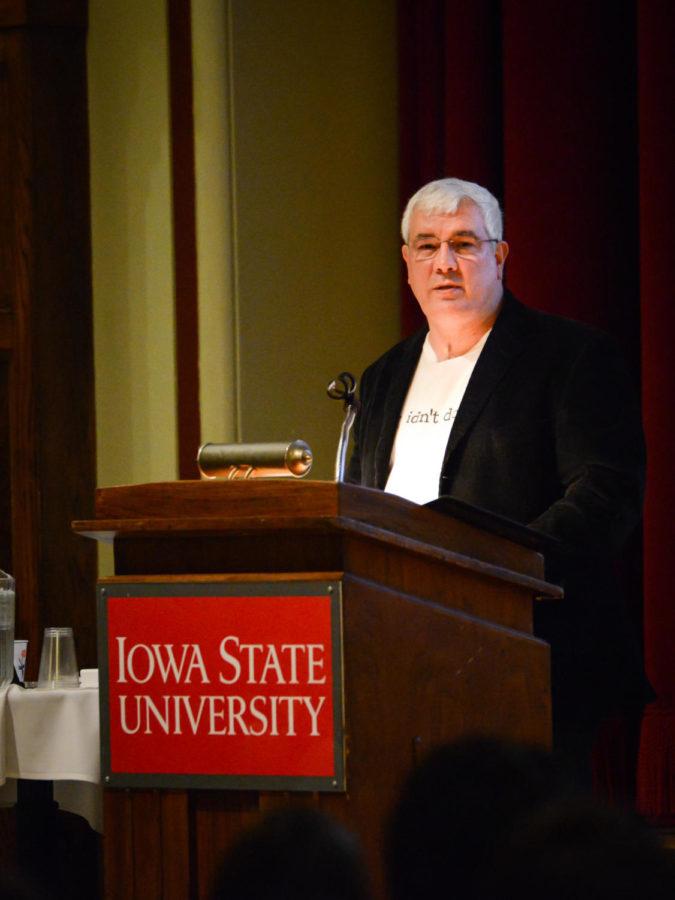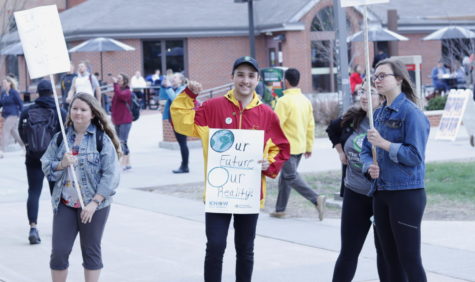Wrongfully convicted death row inmate speaks of experience
April 17, 2014
Kerry Max Cook, a man who spent 22 years as a Texas death row inmate and went through three trials for a murder he didn’t commit, spoke to more than 700 ISU students and Ames community members about his ordeal.
Cook was wrongfully convicted for the rape and murder of 21-year-old Linda Jo Edwards in 1977, because of the fraudulent evidence given by an eyewitness account by Edwards’ roommate and the policeman who found Cook’s fingerprints on Edwards’ door during the investigation of her murder.
As a teenager growing up in an abusive home with a mentally-ill mother and wanting acceptance from his peers, Cook resorted to committing carjackings and other petty crimes for attention. These actions put Cook behind bars constantly and registered his name in the Texas police computer system.
“Once you get in, you never get out,” Cook said about being in the Texas police computer system. Cook’s criminal record followed him wherever he went, causing police to question him and throw him in jail whenever a crime in the area occurred he said.
When Linda Jo Edwards was raped and murdered in 1977, Cook was convicted for the crime two months later because a policeman investigating the crime scene found Cook’s fingerprints on Edwards’ door and an eyewitness account by Edwards’ roommate, Paula Rudolph.
Eventually, it was discovered that Rudolph changed her testimony to make Cook appear responsible for the crime and the policeman had lied about finding Cook’s fingerprints on Edwards’ door.
“This policeman’s entire knowledge of fingerprinting at the time was a 6-month correspondence course,” Cook said.
Cook said that he exhibited good behavior while on death row because he maintained his innocence and he hoped to one day be freed. Cook also said that he got his GED and studied law and psychology while on death row, so that he could become his own lawyer.
“The only thing that kept me sane in that dark tomb was hope,” Cook said. “I knew in my heart when I went to trial, I would go free.”
Eventually, Cook accepted a plea of no contest without an admission of guilt in exchange for immediate freedom in 1999. After Cook was freed, DNA testing of the bodily fluids at the crime scene proved that he was not the perpetrator of the rape and murder of Edwards.
Joseph Mawien, senior in interdisciplinary studies, said he finds it remarkable that the Texas justice system could find an innocent man responsible for a murder and keep him on death row for 22 years. Mawien also said that the nation’s justice system is changing everyday and he hopes that it can free all innocent people currently serving time behind bars.
Diana Jarrell, senior in mechanical engineering, said she attended the lecture because she was intrigued about the subject of the lecture. Jarrell also enjoyed Cook’s statements about standing up for one’s beliefs and always having a positive attitude.
Although Cook wrongfully spent 22 years on the toughest death row in the country, he said he forgives the people that put him in that situation.
“I’m not bitter or resentful for going to Texas death row for 22 years,” Cook said. “It made me who I am today. I’m making a difference in the world in the lives of parents and kids every day by what I do.”

















